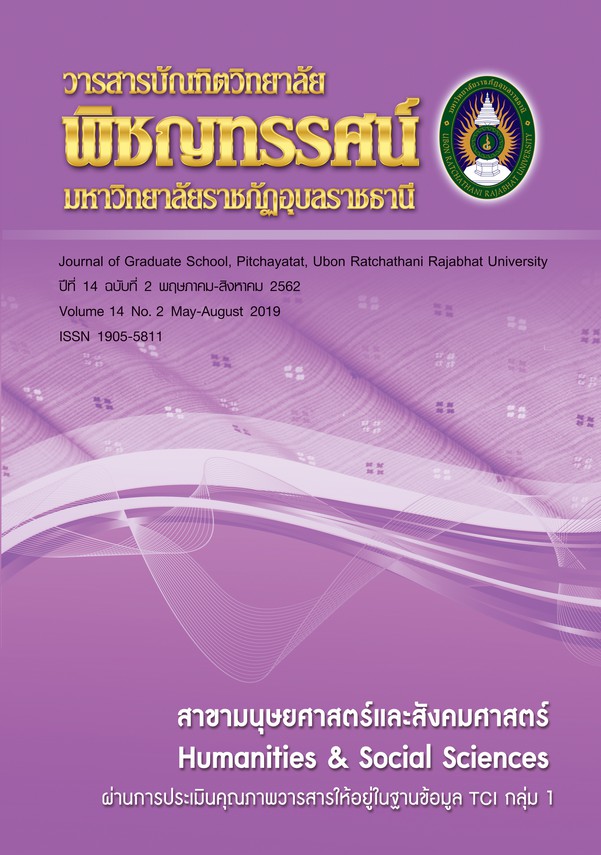การพัฒนาครูในการจัดการเรียนรู้คณิตศาสตร์โดยการประยุกต์ใช้แนวคิดชุมชนการเรียนรู้แห่งวิชาชีพ สำหรับโรงเรียนมัธยมศึกษา
คำสำคัญ:
การพัฒนาครู, การจัดการเรียนรู้, การประยุกต์ใช้แนวคิดชุมชนการเรียนรู้แห่งวิชาชีพ, ครูคณิตศาสตร์บทคัดย่อ
การวิจัยครั้งนี้มีจุดมุ่งหมายเพื่อ 1) พัฒนาระบบพัฒนาครูโดยการประยุกต์ใช้แนวคิดชุมชนการเรียนรู้แห่งวิชาชีพในการจัดการเรียนรู้คณิตศาสตร์สำหรับโรงเรียนมัธยมศึกษา และ 2) ศึกษาผลการนำระบบพัฒนาครูโดยการประยุกต์ใช้แนวคิดชุมชนการเรียนรู้แห่งวิชาชีพในการจัดการเรียนรู้คณิตศาสตร์สำหรับโรงเรียนมัธยมศึกษาไปใช้ การวิจัยครั้งนี้ ประกอบด้วย 2 ระยะ คือ ระยะที่ 1 การออกแบบและประเมินระบบ และระยะที่ 2 การศึกษาผลการนำระบบไปใช้ กลุ่มผู้ให้ข้อมูลและกลุ่มตัวอย่างที่ใช้ในการวิจัยในระยะที่ 1 ได้แก่ ผู้ทรงคุณวุฒิจำนวน 9 คน และในระยะที่ 2 ได้แก่ ครูคณิตศาสตร์โรงเรียนมัธยมศึกษาจำนวน 30 คน เครื่องมือที่ใช้ในการเก็บรวบรวมข้อมูลประกอบด้วย แบบประเมิน แบบสอบถาม แบบสัมภาษณ์ และแบบทดสอบ สถิติที่ใช้ในการวิเคราะห์ข้อมูล ได้แก่ ค่าเฉลี่ย และส่วนเบี่ยงเบนมาตรฐาน ผลการวิจัยพบว่า 1. ระบบการพัฒนาครูโดยการประยุกต์ใช้แนวคิดชุมชนการเรียนรู้แห่งวิชาชีพในการจัดการเรียนรู้คณิตศาสตร์สำหรับโรงเรียนมัธยมศึกษาทำงานผ่านหน่วยระบบย่อย 6 หน่วย ได้แก่ 1) การวิเคราะห์ผู้เรียน 2) การวิเคราะห์หลักสูตร 3) การกำหนดจุดประสงค์การเรียนรู้ 4) การออกแบบกิจกรรมการเรียนรู้ 5) การจัดการเรียนรู้ 6) การวัดและประเมินผล โดยระบบดังกล่าวขับเคลื่อนผ่านองค์ประกอบของชุมชนการเรียนรู้แห่งวิชาชีพ ประกอบด้วย 4 องค์ประกอบ ได้แก่ 1) การสร้างวิสัยทัศน์ร่วมกัน 2) การเรียนรู้และพัฒนาร่วมกัน 3) ทีมร่วมมือกันปฏิบัติงาน 4) การแลกเปลี่ยนเรียนรู้การปฏิบัติงาน ผลการประเมินความเหมาะสมของระบบพบว่ามีความเหมาะสม ความเป็นไปได้ และความเป็นประโยชน์อยู่ในระดับมากที่สุด (x̄ = 4.85, S.D. = 0.44) ผลการนำระบบการพัฒนาครูโดยการประยุกต์ใช้แนวคิดชุมชนการเรียนรู้แห่งวิชาชีพในการจัดการเรียนรู้คณิตศาสตร์สำหรับโรงเรียนมัธยมศึกษาไปใช้ พบว่า 1) ครูมีความรู้ความเข้าใจเกี่ยวกับการจัดการเรียนรู้คณิตศาสตร์โดยการประยุกต์ใช้แนวคิดชุมชนการเรียนรู้แห่งวิชาชีพ โดยมีคะแนนหลังการใช้ระบบสูงกว่าก่อนการใช้ระบบอย่างมีนัยสำคัญทางสถิติที่ระดับ.05 และ 2) ครูสามารถจัดการเรียนรู้คณิตศาสตร์โดยการประยุกต์ใช้แนวคิดชุมชนการเรียนรู้แห่งวิชาชีพโดยรวมอยู่ในระดับมากที่สุด (x̄= 4.71, S.D. = 0.48)
เอกสารอ้างอิง
จอมพงศ์ มงคลวนิช. การบริหารองค์การและบุคลากรทางการศึกษา. กรุงเทพฯ : จุฬาลงกรณ์มหาวิทยาลัย, 2555.
ฑิฆัมพร บุญมาก. การพัฒนาระบบพัฒนาครูในด้านการจัดการเรียนรู้ของโรงเรียนขยายโอกาสทางการศึกษา. วิทยานิพนธ์การศึกษาดุษฏีบัณฑิต มหาวิทยาลัยมหาสารคาม, 2558.
นริศ ภูอาราม. การพัฒนาระบบการจัดการเรียนรู้โดยใช้ชุมชนแห่งการเรียนรู้ทางวิชาชีพสำหรับเครือข่ายโรงเรียนประถมศึกษาขนาดเล็ก.วิทยานิพนธ์การศึกษาดุษฏีบัณฑิต มหาวิทยาลัยมหาสารคาม, 2560.
วิจารณ์ พานิช. วิถีสร้างการเรียนรู้เพื่อศิษย์ในศตวรรษที่ 21. กรุงเทพฯ: พลับลิเคชั่น จำกัด, 2555.
ศึกษาธิการ,กระทรวง. หลกัสูตรการศึกษาข้ันพนื้ ฐาน พุทธศักราช 2551. กรุงเทพฯ: โรงพิมพ์คุรุสภาลาดพร้าว, 2551.
สมจิต จันทร์ฉาย. การออกแบบและพัฒนาการเรียนการสอน. นครปฐม: บริษัทเพชรเกษมพริ้นติ้ง กรุ๊ป จำกัด, 2557.
เสริมศักดิ์ วิศาลาภรณ์ และคณะ. รายงานการวิจัยรูปแบบเครือข่ายการพัฒนาครูและบุคลากรทางการศึกษาตามพระราชบัญญัติการศึกษาแห่งชาติ พ.ศ. 2542. กรุงเทพฯ: สำนักงานคณะกรรมการข้าราชการครู, 2545.
Darling-Hammond. “What matters most : A competent teacher for every child.” Phi Delta Kappan. 78(3), 1996.
DuFour, R., Eakey, R., and Many, T. Learning by Doing A Hanbook for Professional Learning Communities at Work. Bloomington, IN: Solution Tree Press, 2004.
Hord, S. M. Professional Learning Communities: Communities of Continuous Inquiry and Improvement [Internet]. Southwest Educational Development Laboratory, 2004.
Huffman, J. The Role of Shared Values and Visions in Creating Professional Learning Communities. National Association of Secondary School Principals. 87, 637 (December 2003): 21-34.
Mitchell, C. and L. Sackney. Profound Improvement : Building Capacity for a Learning Community. n.d. (Online) 2001 (Cited 2007 July 11). Available from: http://www.sagepub.com
Toole, J. C. and Louis, K. S. The role of professional learning communities in international education. In K. Leithwood & P. Hallinger (Eds.) Second international handbook of educational leadership and administration. Dordrecht: Kluwer, 2002.
Voelkel, Robert Holland, Jr. A Case Study of the Relationship between Collective Efficacy and Professional Learning Communities. University of California, San Diego ; California State University San Marcos, 2011.
ดาวน์โหลด
เผยแพร่แล้ว
รูปแบบการอ้างอิง
ฉบับ
ประเภทบทความ
สัญญาอนุญาต
บทความทุกเรื่องได้รับการตรวจความถูกต้องทางวิชาการโดยผู้ทรงคุณวุฒิภายนอกอย่างน้อย 3 คน ความคิดเห็นในวารสารพิชญทรรศน์เป็นความคิดเห็นของผู้นิพนธ์มิใช่ความคิดเห็นของผู้จัดทำ จึงมิใช่ความรับผิดชอบของวารสารพิชญทรรศน์ และบทความในวารสารพิชญทรรศน์สงวนสิทธิ์ตามกฎหมายไทย การจะนำไปเผยแพร่ต้องได้รับอนุญาตเป็นลายลักษณ์อักษรจากกองบรรณาธิการ





